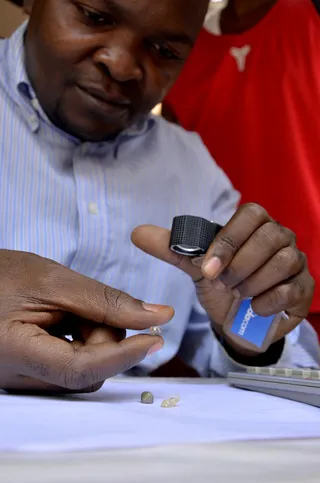53 Years Later: A Look at Congo Since Independence
Decades of conflict crippled this resource-rich nation.

1 / 14
Congo’s National Motto: Unity, Work, Progress - Since gaining independence 53 years ago today, the Republic of Congo has teetered between militia conflicts and civil wars. The African nation may possess a lucrative diamond trade and one of the region’s largest oil industries, but more than half of the country’s 3.6 million people live below the poverty line. Keep reading to learn about Congo’s tumultuous history and its uncertain future. —Patrice Peck(Photo: Junior D. Kannah/AFP/Getty Images)

2 / 14
The First President - After 80 years of occupation, France granted the Republic of Congo full independence on Aug. 15, 1960. Fulbert Youlou became the country’s first president. He ruled for three years, until rival political parties and workers' unrest forced him to resign.(Photo: AFP/Getty Images)

3 / 14
Socialism Sets Sail - As Youlou’s successor, President Massamba-Debat appointed Pascal Lissouba as prime minister, established the National Revolutionary Movement and adopted a socialist route to economic development. He was ousted in 1968 in a coup headed by another Socialist, Marien Ngouabi.(Photos: Wikimedia Commons; ERIC FEFERBERG/AFP/Getty Images)
![Three Congolese Heads of State - Ngouabi set up a new party called Congolese Workers Party (PCT), declaring the country Marxist People’s Republic. In 1977, he was assassinated. Former President Massamba Debat was killed shortly afterward. Joachim Yhombi-Opango would rule for two years before relinquishing the presidency to the PCT. Denis Sassou Nguesso was chosen as his successor in 1979.(Photos: Wikimedia Commons [2]; Xinhua/Landov)](https://images.paramount.tech/uri/mgid:arc:imageassetref:bet.com:ae35a36b-2948-420c-a922-c588f82ed8b6?format=webp&width=320)
4 / 14
Three Congolese Heads of State - Ngouabi set up a new party called Congolese Workers Party (PCT), declaring the country Marxist People’s Republic. In 1977, he was assassinated. Former President Massamba Debat was killed shortly afterward. Joachim Yhombi-Opango would rule for two years before relinquishing the presidency to the PCT. Denis Sassou Nguesso was chosen as his successor in 1979.(Photos: Wikimedia Commons [2]; Xinhua/Landov)

5 / 14
An Anti-Capitalist Congo - Led by Sassou Nguesso, Congo signed a 20-year pact of friendship and cooperation with the Soviet Union, aligning the country with the Eastern Bloc. Nine years later, PCT, the Congo’s sole legitimate party, abandoned Marxism.(Photo: Nikolay Doychinov/Landov)
ADVERTISEMENT

6 / 14
Democracy Prevails - The country’s democratic progress appeared to get back on track in 1992, with voters approving a constitution that reinstated a multi-party structure. Former Prime Minister Pascal Lissouba becomes president in the first democratic election.(Photo: STR New/Reuters)

7 / 14
Bloodshed in Brazzaville - Contested parliamentary elections led to a year of bloody fighting between government and opposition forces. A ceasefire was reached, which resulted in the opposition receiving government positions. Yet, nearly two years later, a full-scale civil war erupted. President Lissouba was forced to flee when pro-Sassou Nguesso forces seized the capital, Brazzaville.(Photo: Corinne Dufka/Landov)

8 / 14
Finding Peace - In 1999, a peace agreement was reached in Zambia between the government and most of the rebel units. A national dialogue soon followed, as well as the neutralization of all political parties and the re-entrance of rebel groups into the security forces. A new constitution was also approved in 2001, enabling long-awaited presidential and parliamentary elections.(Photo: YOAV LEMMER/AFP/Getty Images)

9 / 14
Sassou Nguesso Seizes Victory - A year following the December 2001 conviction and severe sentencing of former President Lissouba, Sassou Nguesso easily won the presidential election with a much contested 90 percent of the votes. Two of his main opponents were banned from the race, while a third withdrew, citing voter fraud. Sassou Nguesso also adopted a new constitution that granted him new powers and extended his term.(Photo: Pedro Ugarte/POOL/Landov)

10 / 14
Clashes With Rebels - The government and a self-professed Ninja rebel group led by a former prime minister came to blows in March 2002, culminating in intense fighting, which forced thousands of civilians from their homes. Nearly 100 people were killed in Brazzaville as the clashes continued. One year later, the conflicting sides came to a consensus, allowing the return of the rule of law. (Photo: Antony Njuguna/Landov)
ADVERTISEMENT

11 / 14
Blood Diamonds - Amid allegations of illegal diamond dealings — mainly that diamond purchases were financing violent rebel movements — Congo was removed from the Kimberley Process in 2004. The country was reinstated in 2007. (Photo: JUNIOR D.KANNAH/AFP/GettyImages)
Photo By Photo: JUNIOR D.KANN

12 / 14
Burning Ammunition - To prove their commitment to peace, former Ninja rebels burned their weapons in June 2007. However, some members have refused to disarm and remain active in the Southern region where they have resorted to crime, reported BBC News. (Photo: Martin VAN DER BELEN/AFP/Getty Images)

13 / 14
Debt Canceled But Prospects Dim - In 2010, a number of private sector creditors and creditor countries agreed to cancel several billion dollars worth of debt owed to them by Congo. Brazil also proclaimed in 2013 that it would cancel or restructure $900 million worth of debt with Africa, including Congo, according to BBC News. (Photo: Brent Stirton/Reportage by Getty Images)
